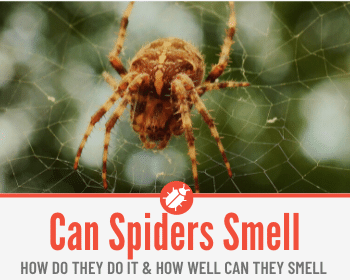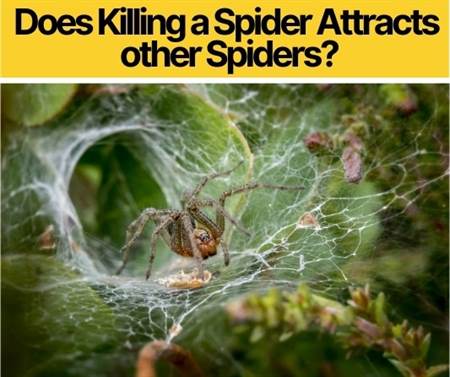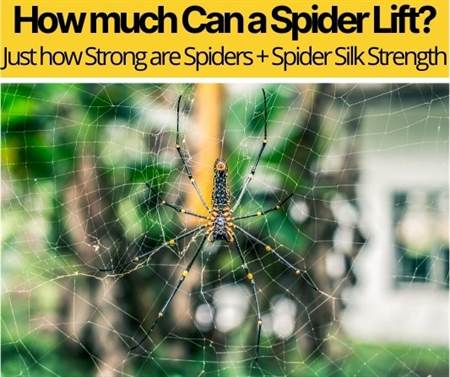 Have you ever wondered if your eight legged intruder can smell your fear?
Have you ever wondered if your eight legged intruder can smell your fear?
Wondering if Spiders have a Nose or Any other way to Smell. If so are There any Smells Spiders hate that can keep them away?
In this guide you Will Learn If Spiders can Smell, How well Spiders can smell & How do they do it!
Can Spiders Smell?
Yes! Spiders can smell very well, not by gaping nostrils or using a sophisticated snout, but from fine hairs on their legs.
Although each spider can smell, some are slightly more advanced than others.
The Jumping Spider for instance, or as it is more interestingly known, ‘The Vampire Spider’ is one of the most advanced among these.
These guys have incredibly fine, air sensitive hairs that allow them to recognise movement generating air currents.
This means that it is easy for them to scout out their victims; mosquitos. They are actually able to detect human blood in the mosquitos, hence the name.
Although Jumping Spiders may hunt out your blood, they are not looking to hunt you.
Just like many spiders common to the USA, the Jumping Spider is harmless and can only consume liquids and therefore doesn’t have a strong enough bite to harm you.
Similarly, your pet Tarantula detects chemical cues via specialized hairs in their environment, which allows them to be able to smell.
How are Spiders able to Smell
All spiders acquire the ability to smell through their legs. This is done through sensory organs that are able to determine if something is edible or harmful to them.
These sensory organs are known as the ‘silt sensilla’ which are distributed amongst their exoskeleton and are minute organs aiding their smell.
This works by the hairs on their legs sensing an items’ chemical make-up by touch, to deduce whether it is prey or whether it is something that might have blown into the web, such as grass.
Webs are great for sensing these vibrations as they are easily passed down the silk.
Spiders have 3,000 strain sensors or ‘silt sensilla’ embedded in their exoskeleton, most of these located on the legs or feet which receive the information processed from these vibrations.
Also helping them to smell are their ‘pedipalps’ which are the two little legs located at the front of their head, resembling antenna.
Although all spiders possess these, some use them for holding prey and others use it for sensing the vibrations, helping them to smell.
The pedipalps also exert an element of taste which may explain why spiders are not particularly fond of being handled.
This means that if a spider is on you, it can likely smell and taste you. This is why you should aim not to handle spiders for their own benefit.
Tarantulas are known for this, as they do not bond well with their owners.
Also read: Identifying Spiders with Long legs
How Well Do Spiders Smell?
Spiders have a relatively good sense of smell, but this relies on their ability to physically touch the item where the smell emanates from, due to the receptors being located on their legs.
Spiders don’t have particularly good eye sight, and have therefore evolved their other senses; such as their smell, in order to make up for this.
That is of course, with the exception of the Jumping Spider, which has exceptional vision with four pairs of eyes and 360o vision. They have also been known to be curious of humans.
Some spiders have also been known to set off a chemical smell as a warning to other spiders, that a certain habitat is already occupied or in order to find a mate.
Spiders therefore do not like stronger, more pungent smells as it can harm the spider to come into contact with them.
Can Spiders Smell Human Fear?
There is not a lot of research into this field as of yet, however it is believed that if humans release a chemical in fear, then it is not impossible for a spider to be able to detect it.
However, spiders are only likely to be able to pick up information that is useful to them and so if the chemical released would be one shared with other species such as plants or animals that are frequently in contact with spiders, then they may be able to process your fear.
Humans also tend to react via hand signals or verbally which spiders cannot see but can sense the vibrations of.
What Smells Do Spiders Hate
- Vinegar
- Eucalyptus
- Peppermint oil/ cinnamon oil
- Citrus
- Lavender
- Cedar incense
- Tea tree
- Insecticides
- Conkers (horse chestnuts)
Spiders aren’t fond of anything strong or acidic, so these overpowering smells can be great deterrents for them entering your home, and will keep them away.
Will Vinegar Smell Keep Spiders Away?
Vinegar, due to its acidity, can be a great deterrent for spiders.
In order for this to work it must be made into a solution with water and sprayed on corners or crevices where spiders may be likely to cross or enter.
However you, like spiders, may not like the overpowering smell and therefore a citrus or cinnamon solution will be just as effective.
Do spiders hate the Smell of Insecticide?
Similarly, spiders don’t like the smell of insecticides. If applied directly insecticides would kill them, but applying them to windowsills, like the vinegar solution, would not work. However spiders are not insects and therefore pesticides are a more effective option.
Can Lavender Aroma, Incense Smell or Peppermint Oil Keep Spiders away?
Aroma will not keep them out, such as burning candles or incense so in order to successfully keep them out these must be applied to areas where spiders are likely to cross, such as window sills, cracks and crevices.
This is also due to the fact that spiders can only detect them through touch and so these methods will not be effective deterrents unless the spider physically comes into contact with them.
A few drops of these liquids can kill spiders, so it is not recommended unless that is your plan. It is much better to take them in a glass outside or leave them be, as lots of spiders end up indoors by accident and get stuck inside.
What smells do Spiders Like?
Nothing can really attract spiders smell-wise; they are only interested in food and shelter looking for places that are dark and of high humidity.
There are spiders that are attracted to fruit however, these are not native to the USA and if you happen to find one in your banana you should be alarmed as it’s likely to be a Brazilian Wandering Spider.
Are Spiders Attracted to Beer Smell?
Some people believe that spiders can be attracted to beer, however they cannot digest human or pet food and so it would be of no interest to spiders to seek them out.
I’ve certainly never been ambushed in the pub for my pint!
Spiders are only able to consume liquids and don’t process lumps very well, studies have shown that alcohol and caffeine can have an effect on spiders if consumed, making them hyperactive or slower and making their web division a lot more unusual.
Spiders & Their Dislike for Dirty Socks
A study was conducted on general spiders in cages and the spiders exposed to the dirty sock took longer to exit the cage as opposed to the spiders that weren’t, evidencing their dislike of strong smells.
Although spiders despise strong smells, Jumping Spiders are known to like dirty socks as it can lead them to their prey.
Spiders also like messy places as they are looking for somewhere to hide with warmth and shelter.
So if you’re looking to keep your eight-legged friends out, keep a clean house and spray windows and corners with a part vinegar or citrus and water solution.
Spiders are ultimately trying to avoid you and can sense you via vibrations if you see them about, they are either on their way for food and shelter or are searching for a mate.






